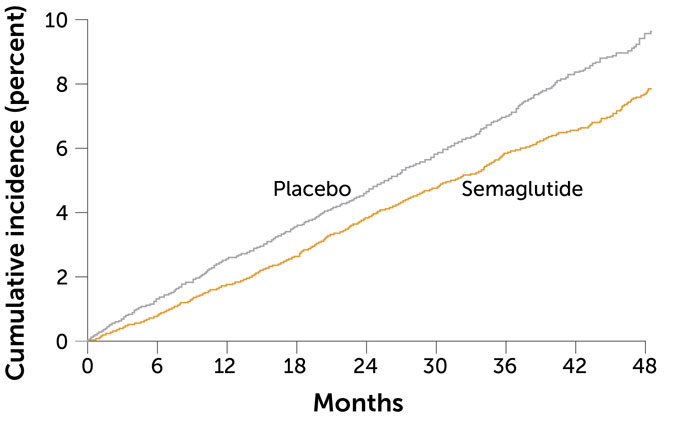The weight-loss drug Wegovy lowered heart attack risk in a large trial
Weekly injections of the medication cut the number of serious heart problems

Results from a new clinical trial suggest that weekly injections of Wegovy can lower the risk of serious heart problems in some adults.
Michael Siluk/Alamy Stock Photo
PHILADELPHIA — At the recent American Heart Association meeting, a cavernous room full of doctors erupted into applause. Cleveland Clinic cardiologist A. Michael Lincoff had just presented the dramatic — and at times enigmatic — results of a new clinical trial on the weight-loss drug semaglutide.
The drug, sold under the brand name Wegovy, cut patients’ risk of major cardiovascular problems by 20 percent, Lincoff reported November 11. It also reduced the risk of dying — from any cause — over the roughly 40 months patients participated in the study on average.
Lincoff’s work notches yet another role for semaglutide, which doctors currently use to treat diabetes and obesity. Previous work had already uncovered a cardiovascular benefit in people with type 2 diabetes. The new study, which targeted overweight or obese patients with cardiovascular disease, is the first to show that semaglutide can help the hearts of people without diabetes too.
That’s important because it expands the number of people who could benefit from the drug, says Tiffany Powell-Wiley, a cardiologist and epidemiologist at the National Heart, Lung and Blood Institute in Bethesda, Md. In the United States alone, more than 6 million obese or overweight people have cardiovascular disease but not diabetes. Semaglutide could be a game changer for these people, says Powell-Wiley, who was not part of the new trial. Still, she and others at the meeting recognized the limitations of the study — and the limitations of the drug.
As much as we may want a quick fix for the rising levels of obesity seen around the world, Powell-Wiley says, “it’s important to understand that this isn’t the panacea.” We still don’t know how well semaglutide works in a diverse group of people, she says. And the drug doesn’t fix the societal, environmental and social factors that lead to obesity — and its potential health consequences — in the first place.
Semaglutide reduced the risk of heart attack, stroke and death
Semaglutide is one among a family of drugs gaining popularity for treating obesity. On November 8, the U.S. Food and Drug Administration approved a new one: tirzepatide, a relative of semaglutide that goes by the brand name Zepbound. [See also: Semaglutide FAQ ]
Semaglutide, sold under the brand name Ozempic, first came on the market for treating diabetes in 2017. Since then, the drug’s slew of uses has kept growing. In 2020, the FDA OK’d it for cutting cardiovascular risk in people with diabetes and heart disease. And in 2021, treatment for obesity (with the higher dose Wegovy) joined the list.
Lincoff’s semaglutide trial, called SELECT, included more than 17,000 people, half of whom received weekly injections of semaglutide for roughly three years; the other half got a placebo. By the end of the trial, 8 percent of the people in the placebo group had had a nonfatal stroke or heart attack or died due to cardiovascular causes. That number dropped to 6.5 percent in the semaglutide group, Lincoff reported at the meeting and online November 11 in the New England Journal of Medicine.
Risk reduction
In a trial of 17,000 adults, those taking the drug Wegovy were less likely to experience nonfatal heart attacks, nonfatal heart strokes or death due to cardiovascular causes than those taking a placebo. This reduction in risk occurred early in the trial — before participants had lost a lot of weight. That suggests the drug may somehow be boosting heart health directly.
Time to first cardiovascular problem among study participants

The difference between the two groups may not sound like much, but “it’s a massive result,” says Amit Khera, a cardiologist at UT Southwestern Medical Center in Dallas who was not part of the trial. One can’t underestimate the importance of finding a new treatment for patients with cardiovascular disease, he says.
The illness is “the largest source of mortality in the world,” Lincoff said at a news conference on November 10, and there’s no single therapy that can eliminate it. Instead, doctors try to chip away at it with various treatments that offer incremental benefits.
For overweight or obese people with heart disease, Khera says, semaglutide is another tool in cardiologists’ toolkits.
Questions remain about how the drug works — and for whom
The new study results flesh out earlier news of the trial released by funder Novo Nordisk in August (SN: 8/29/23). At the time, doctors wanted to know who the drug helped, how it worked and what side effects it set off. The latest report offers answers to some questions but kicks others wide open.
Participants on semaglutide were slightly more likely to drop out of the trial than those taking the placebo. That difference seemed to be driven by the drug’s gastrointestinal side effects, which include nausea, diarrhea and vomiting. The number of serious issues that occurred, like cancer or infection, was slightly lower in the semaglutide group.
Though semaglutide offered clear cardiovascular benefits for patients, one mysterious aspect of the data snagged researchers’ attention. The drug’s protective effects became apparent early in the trial — well before participants had shed lots of pounds.
That’s a big deal because it suggests semaglutide may be boosting heart health directly, perhaps in addition to the typical benefits that accompany weight loss, says Caroline Apovian, an obesity medicine specialist at Harvard Medical School and Brigham and Women’s Hospital in Boston. She was not involved in the study but is on Novo Nordisk’s scientific advisory board. Lincoff said his team is “working feverishly” on analyzing the SELECT data to better understand semaglutide’s actions.
Those data include demographic and medical information on thousands of trial participants. But the trial does have one “huge limitation,” says Powell-Wiley: 84 percent of the study’s participants were white and 72 percent were men.
Expanding the diversity of people represented in clinical trials like these is crucial, she said. It’s a point she brought up in a panel discussion after Lincoff’s talk, and one that — like the trial’s results — garnered widespread applause. In the United States, African-American, Hispanic and Indigenous people are most impacted by obesity, Powell-Wiley says, and the new trial doesn’t tell us much about how semaglutide works in those groups.







